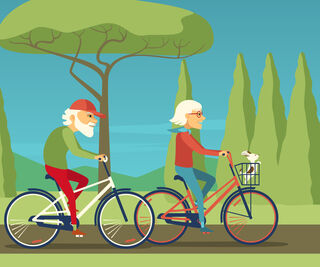Aging
Why Staying Active As We Get Older May Help Us Live Longer
Exercise reallocates energy to pathways that repair and strengthen aging bodies.
Posted November 27, 2021 Reviewed by Abigail Fagan
Key points
- Our ape cousins spent most of the day sitting; they died younger than our hunter-gatherer ancestors, who spent more time on the go.
- The "active grandparent hypothesis" posits that lifelong physical activity promotes better health and longevity by reallocating energy.
- Daily exercise steers excess metabolic energy away from harmful mechanisms towards life-extending repair and rejuvenation as we age.

A team of evolutionary biologists and biomedical researchers at Harvard University recently published some fresh insights about why staying physically active across the human lifespan is vital to aging well. This perspective piece (Lieberman et al., 2021) appears in the December 14 issue of the peer-reviewed journal PNAS.
According to the authors, their latest paper offers "the first detailed evolutionary explanation for why lack of physical activity as humans age increases disease risk and reduces longevity."
The five coauthors of this paper include first author Daniel Lieberman along with Timothy Kistner and Daniel Richard of Harvard University's Department of Human Evolutionary Biology, senior author Aaron Baggish of Harvard Medical School's Cardiovascular Performance Program at Massachusetts General Hospital, and I-Min Lee of the Division of Preventive Medicine at Harvard's Brigham and Women's Hospital.
Their new theory was inspired by the evolutionary biology of our ape cousins living in the wild who spend a lot of time sitting each day and don't typically live long enough beyond their child-producing years to become active grandparents. Chimpanzees in captivity have a life expectancy of 30-40 years and rarely live to be 50.
Conversely, humans living as hunter-gatherers are physically active across their lifespans and live several decades beyond when they stop reproducing.
For example, although the South American Tsimané foragers of lowland Bolivia don't typically have access to modern health care, they generally live to be about 70 years old and stay physically active during these post-reproductive years.
"We evolved basically from couch potatoes," Lieberman quipped in a news release about this paper. "The good news is that you don't need to be as active as a hunter-gatherer. Even small amounts of physical activity—just 10 or 20 minutes a day—substantially lower your risk of mortality."
The Active Grandparent Hypothesis: Our Bodies Evolved to Thrive When Energy Is Reallocated via Physical Activity As We Age
From an integrative medicine and habit formation perspective, getting regular exercise is associated with less comorbidity and longer lifespans, which makes becoming grandparents more common.
In their latest paper, Lieberman et al. present what they've coined the "active grandparent hypothesis." This new theory builds on previous life-history research and posits that staying physically active as we age is vital to "the evolution of extended human healthspans and lifespans."
Countless evidence-based studies have found that regular physical activity slows senescence, decreases morbidity, and offsets premature mortality. However, public health advocates and epidemiologists are always looking for new insights that help to explain why a lifelong habit of staying physically active preserves older adults' health and extends lifespans.
Until now, an evolutionary theory as to why staying physically active during midlife and into older age promotes better health and longevity has been lacking. The authors sum up their new active grandparent hypothesis in the paper's abstract:
"We hypothesize that selection in humans for lifelong physical activity, including during post-reproductive years to provision offspring, promoted selection for both energy allocation pathways which synergistically slow senescence and reduce vulnerability to many forms of chronic diseases."
Habitual physical activity redirects energy away from potentially harmful fat storage and reallocates it towards physiological processes that repair, rebuild, and slow the age-related deterioration of our bodies. Hence, the authors speculate that "extended human healthspans and lifespans are both a cause and an effect of habitual physical activity."
Exercise-Induced Energy Reallocation Utilizes the Calories You've Eaten in Ways That Make Your Body Healthier and Stronger
Physical activity causes the body's energy reserves to be redirected towards doing things like fortifying weight-bearing bones and repairing broken-down muscle fibers, making them both stronger and more resilient. Moderate-to-vigorous physical activity also triggers the release of anti-inflammatory cytokines and reduces chronic inflammation.
"Because we evolved to be active throughout our lives, our bodies need physical activity to age well," Lieberman concludes. "It's a widespread idea in Western societies that as we get older, it's normal to slow down, do less, and retire. Our message is the reverse: As we get older, it becomes even more important to stay physically active."
References
Daniel E. Lieberman, Timothy M. Kistner, Daniel Richard, I-Min Lee, Aaron L. Baggish. "The Active Grandparent Hypothesis: Physical Activity and the Evolution of Extended Human Healthspans and Lifespans." Proceedings of the National Academy of Sciences (First published: December 14, 2021) DOI: 10.1073/pnas.2107621118
Kaplan et al."Coronary Atherosclerosis in Indigenous South American Tsimane: A Cross-Sectional Cohort Study." The Lancet (First published: March 17, 2017) DOI: 10.1016/S0140-6736(17)30752-3




